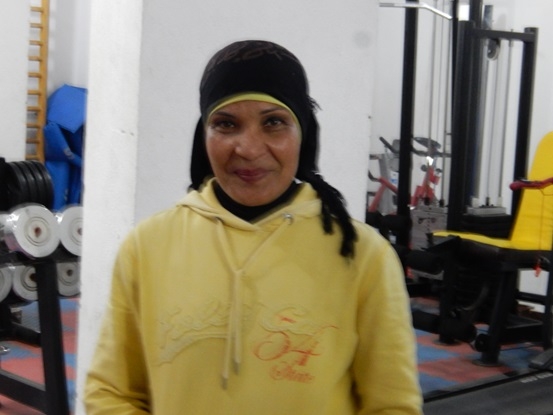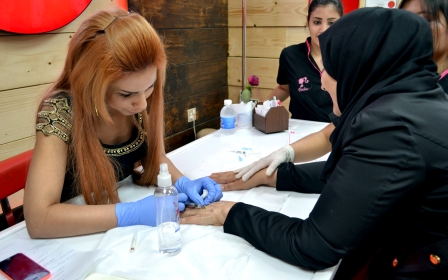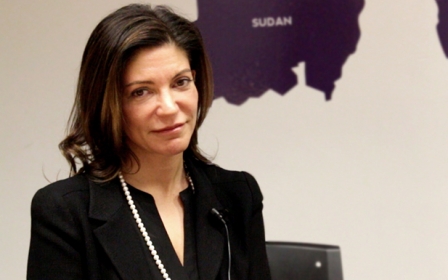Egyptian women fight obesity with exercise

From the outside, 5 Gym appears small and neglected; one out of Cairo's many overambitious local gyms. Once inside, the small basement is packed with vivacious women, diligent at each of the gym's workstations. The eclectic atmosphere resembles the backstage of a girls' ballet recital minutes before the performance. Thirty women rotate between the coveted treadmills, bicycles, weights, and vibrating plates, asking each other politely for a turn. The thrilling scene has the quality of a mirage in this dusty megacity; except the smell of sweat is real enough to erase all doubt of realism.
Obesity is an endemic problem of global proportions that affects men, women and children of all social backgrounds. In Egypt, half of all women suffer from obesity; with the percentage of obese women being twice as high that of men, 48 percent and 22 percent respectively. The problem of obesity also stands as a severe public health risk to Egyptians, which landed 19 on the list of countries with the highest obesity rate.
Understanding obesity in terms of the wide discrepancy between obese men and women highlights important aspects in the culture of present day Egypt, which could prompt the government to seek solutions that are specific to women's circumstances. But more importantly, it illustrates the rise in health awareness among Egyptian women and the ways in which they are taking action.
Diet and Lifestyle
“We are a food culture,” said Ayat Abdel Mooty, certified Zumba and aerobics instructor, who also is a former deputy minister at the Ministry of Sports. Family gatherings, social outings and celebrations, all merit the presence of food.
The growth of fast food chains and online delivery services has upended the way people eat in Egypt. The history of fast food in Africa's most populous country traces back to Wimpy’s in the 1970s, the first international burger chain. But it wasn't until McDonalds penetrated the market in 1994 that fast food became prevalent. As of December 2013, thirty three food and beverage companies contributed $70.1m to the Egyptian economy.
“Fast food containing trans fats and high sodium causes heart disease and water retention,” Nairooz continued, “this in turn, affects immunity and mood.”
The excessive calorie consumption and sedentary lifestyle in Cairo has created an obesogenic environment that affects Egyptians from an early age. “Modern life is one of the essential causes for obesity,” said Dr Samir Nairooz, weight management consultant and professor of Medicine at Ain Shams University.
“The city that doesn't sleep” abounds with fast food restaurants and street cafes, which are open at all hours of the day. “Whenever we are hungry, we eat,” Ayat points out, and the same is true for sleep. In Cairo, it is not uncommon to see children roaming around the streets or the house at late hours of the night as men sip tea in the street cafes and families watch television at home.
“People don't sleep enough, especially children when there is no school,” Nairooz said in his clinic in Mohandeseen. However, the obesogenic environment in Egypt is not only a result of people's volition. The Egyptian government spends a meager 5.8 percent of total government expenditure on health, while OECD member countries spend 17 percent on average. To counteract the overindulgence in fast food, education and awareness of healthy food choices is necessary, argues Nairooz. One such initiative is the growing presence of nutritionists like Nairooz in the many widely different cooking shows.
“Regime” - the characteristic behaviour or orderly procedure of a process - is the word used for dieting in Cairo, but the structure implicit in the word doesn't always carry into women's lifestyles.
“People associate health with diets,” said Hana Zuhair, an Egyptian blogger on healthy eating in Cairo. Without a significant change in diet, women's weight will continue to fluctuate and their health only momentarily improve [by dieting].
The many ways women move
Horus Gym is located in the middle class neighbourhood of Dokki and like other gyms of its tier, is decorated with colossal pictures of body builders. The monthly membership fees for shabbi gyms (gyms for the working class) like Horus vary between 200-300 EGP ($26-$39), making them the most accessible gyms in Cairo. Despite targeting a male clientele, the gyms offer women-only hours, consisting of two-hour intervals in the mornings or afternoons.
The reasons that attract women to women-only hours vary from one person to another, but the safety generated by these spaces is a driving factor for most of them. Once the specified hour strikes, the masculinised gyms are transformed into female spaces where women previously donning a hijab, jalabiya or burqa take off their street attire and begin to exercise.
Women-only hours reconcile the friction sparked between covering and conventional sportswear, which previously dissuaded some Muslim women from exercising. The hijab is a powerful sign of faith and respectability in the community, and even though women exercise with the veil during mixed hours, most prefer to take it off during the privacy of a female only environment.
The issue of covering goes beyond the shaabi gyms into the broader issue of covering and sports. In 2012, the FIFA lifted its ban on the use of the headscarf, which was set in place for safety and medical reasons. Recently, Egyptian women also succeeded in pushing the International Basketball Federation, FIBA, to lift its hijab ban.
¨It's a Muslim country,” said Heba, 27, where women-only hours act as an incentive for women to exercise, but it's not a necessity for all. Covering, relentless sexual harassment and lack of green public spaces hampers a full-blown exercise culture in Cairo. Yet, as far as gyms are concerned, for a woman like Heba, “if gyms were only mixed” she would still go, she said resolutely.
Exercising is directly connected to affordability and it remains a luxury in a city where 48.9 percent of Egyptians live below the poverty line. However, a study carried out in 2008, showed that the highest wealth quintile was twice as likely to be overweight as the lowest quintile, thus proving that obesity affects Egyptian women across the socio-economic spectrum. While the variety of gyms and fitness classes is wider for upper class women - be it yoga, Zumba, aerobics, salsa, or kickboxing - shaabi gyms provide the accessibility to exercise that the current government does not.
Why women exercise
"Obesity now is not a matter of beauty,” said Nairooz matter of factly. “Women come to me because they can't have a baby.” Polycystic ovary disease afflicts women who suffer from obesity and constitutes a main reason why they pay a visit to the doctor.
“Severe pain in the joints arises from the extra weight carried by the knee joints, also resulting in back problems,” he continued. In addition, women's failure to make permanent changes in their lifestyle results in rebounding and a disturbance of their metabolism, “which is very bad,” he warned.
Out of the three women at Horus, Sandrus is the oldest and shows agility that exceeds her weight and disposition. “I come to the gym because I gained a lot of weight and my husband didn't like it,” said Sandrus, 40. “I also have knee problems and after coming to the gym for two months, I don't need to take medicine anymore,” she said.
Child obesity is on the rise in Egypt and shaabi gyms don't fail to attract young girls like Mariam, 12. “My father became upset that I had gained weight,” she recalled. When ask whether her mother came to the gym, Mariam shook her head and said it was too late for her mother to move. At her fifties, Mariam's mother weighed 200 kilos.
“When young girls come to see me, I tell them to dance at home,” said Nairooz, “just dance for 20 minutes,” it´s imperative that they move.
For thirty minutes Nagat, the female trainer at Horus, barked orders at the women. “One, two, three,” she counted down the crunches, squats, arm lifts, and leg lifts.
Amira a short, plump 18-year-old, followed Nagat with controlled movements. “I started coming to the gym because my friends were making fun of my weight,” she explained. When she started exercising, Amira weighed 75 kilos and claims to have lost ten kilos in only two months. “I have diabetes and my family was very supportive of me.”
A common denominator attracting Egyptian women to exercise is appearance. Amira explained that before she became conscious of her weight, suitors would come to her house and become dissuaded from courtship because of her size. The social pressure to marry in Egypt starts at an early age for men and women - the former conflicted by money and the latter by appearance.
“Young women exercise for looks,” said Mai, a 25-year-old personal trainer in an upscale gym in Maadi. “Before the age of forty, women come to the gym because they want to look good at work, school or because they are about to get married,” she said.
Gender performance and social expectations of femininity in Egypt can affect young women's interest in sports, as a culture of sport is yet to solidify. “Girls are put in the mindset where they have to be 'girly girly',” said Zuheir, “and [they] are not interested in being a tomboy." However, Mai is hopeful and argues that, “If girls start doing sports at an early age, they will continue.”
Low self-esteem, stress, social pressures, and depression also are contributing factors to obesity. Fatma, an Egyptian self-defence instructor at WenDo and a Zumba dancer, blames the unhealthy body image women develop in Cairo, where 99.3 percent of women have been harassed.
Initiatives like WenDo empower women to become physically and emotionally strong. "[With Wendo], you are letting out all the traditions and stigmatisation that you have been hearing and receiving all your life,” she said candidly, “and you try to accept yourself.”
Other initiatives
An exercise culture is slowly emerging in Cairo as health awareness rises and social pressures grow among Egyptian women. Egypt has approximately 39 million women and girls and each chooses if and how to be active. Initiatives like Cairo Runners and Egy Runners, which organise weekly runs across Cairo, are free of charge and growing in numbers. Igmadi, which promotes an active lifestyle through Zumba and self-defense, amid numerous other fitness classes, are challenging traditional dieting as the only fix for weight problems.
Fitness is becoming a reality for a growing number of Egyptian women. A culture for exercise is slowly enticing women to leave the house and prioritise their well-being.
It is the women at 5 Gym, flapping their arms and bouncing up and down to the rhythm of up-beat Latin music, who are shifting the paradigm when it comes to their health. They know that they will feel the soreness of their taut muscles when they lift the baby, climb the steps to the apartment, buy the groceries at the market, cook dinner, or walk to work. But they also know that it is worth it.
New MEE newsletter: Jerusalem Dispatch
Sign up to get the latest insights and analysis on Israel-Palestine, alongside Turkey Unpacked and other MEE newsletters
Middle East Eye delivers independent and unrivalled coverage and analysis of the Middle East, North Africa and beyond. To learn more about republishing this content and the associated fees, please fill out this form. More about MEE can be found here.




